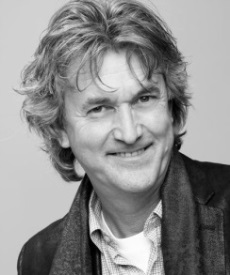|
|
COMPOSERS' CORNER with Brett Abigaña VOL. VI August, 2016
An Interview with Johan de Meij This month, I spoke with composer Johan de Meij about his music and the musical and educational world we live in.
BA - From your perspective, how has your music changed and developed over the last 20 or so years? JdM - Well, I always try to come up with new stuff. I try not to repeat myself: on the contrary, I try to come up with new ideas, new approaches, new instrumentations, etc. Much of my music, I think, is recognizable as having the "de Meij sound", but they don't sound the same. I mean, if you compare "The Big Apple", my Second Symphony, to "The Lord of the Rings", they're totally different pieces, using a different language. BA - As you know, there's a trend in music for wind band towards a somewhat formulaic sound. There are those of us composers who are trying not to fall into the habit of becoming formulaic, but it seems there are several conductors and educators who still really go in for that predictability. Is there anything you think composers in general can do to fix this? JdM - No, I don't think so. I think it's comparable to dining. A lot of people just go to McDonalds: it's cheap, it's easy, and it fills your stomach. But we like to go to a fine dining restaurant and have a great experience. The reason is that the type of work you're talking about is very commercial: they sell well, so why not write another one? And they're all to blame: the publishers, the composers, and the conductors who buy that music. We should just keep writing great music, and hopefully it will stick out. BA - Now as someone who has spanned both the orchestra and band world, you've seen the difference in the way new music is approached in those circles. What do you see the difference to be, and do you think it's healthy? JdM - Well first of all, I try not to write any differently for either orchestra or band. And several of my pieces exist in both versions. I've never had a lesson in my life, and I learned to orchestrate by reading scores of the greats: Tchaikovsky, Dvorak, Mahler, and so on. So I don't have a different mindset when I write for either orchestra or wind band. BA - Do you find that there's a difference in how your music is received in those two worlds? JdM - Yeah, my band music is much more popular than my orchestral pieces. The orchestral version of a piece may get played a couple times a year, which is great. But the band version gets played a hundred times a year. I wish I had some more symphonic performances, but orchestras are not as adventurous as bands. Bands love to premiere pieces and commission composers, but orchestras, not as much, so it's much harder to get into a symphonic program than in a band program. And writing for orchestra is much easier than writing for band. You never know if you're going to have 2 flutes or 14! In an orchestra, you know what you're going to get, and everything is balanced for you. BA - What do you wish educators knew about composers in general and how to work with us? JdM - That's a hard one. I don't think a lot of conductors or educators know what it is to compose a new work. So what I always try to do when I give lectures or masterclasses is to explain the process and the frustration of writing a new piece. People have this romantic idea that I just sit down with a gorgeous melody in my head and all I have to do is write it down. Well it's the contrary: you really have to sit down and work, and there are days when nothing comes out. And that question, "What inspired you to write this piece?" The answer is usually "Nothing." That is the least important thing. I don't know about you, but with me, the inspiration comes when the piece is 80% done. Then I can see things, move things around, take things out and for me, that's the happy part of writing a piece. BA - I agree! My favorite part of the process is when I have to get up and walk around out of sheer excitement for what I just wrote. And that almost never happens at the beginning of the creative process. But I keep chasing it. JdM - Yeah, I love that feeling! BA - Do you have any general advice for a composer right out of school who wants to break into the business? JdM - Try to find your own voice. Become who you are. If you play a Mahler symphony, in two seconds, you know who it is. The same with Shostakovich. You need to study the masters, listen to what's out there, listen to form and structure, and in the end, try to find your voice in an early stage and be yourself. BA - Do you think self-publication, in today's age, is a worthwhile business endeavor for a composer starting out? If you can get with a publisher, should you? JdM - Yes, I'd say if you can get a good publisher, go with it. With self-publishing, you get all the benefits, but you also get all the paperwork, all the administration, and everything else. The hardest thing to get is the distribution. But if you have a good publisher, all of that is handled. Otherwise, it takes too much time, and it has nothing to do with creating music. It's still a lot of work to make everything print ready, but it's so much easier than self-publishing. And getting a good publisher is hard. Big publishers like Hal Leonard get maybe ten publishing requests a day from composers. And there could be a real gem among those ten, but maybe not. That's why publishers should be very careful about what they put out there. Stay tuned for next month's installment of Composers' Corner when I explore our piece of the month, Jeremy Van Buskirk's Closer to Home.
|




